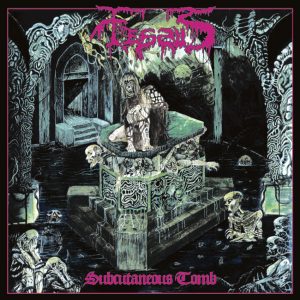WHOREPHOBIA IN METAL METAL AS THE GUARDIAN OF ABSOLUTE MORALITY

When I wrote “Metal and Misogyny: How to Turn Sexual Violence into Your Personal Brand,” I said I’d discuss whorephobia in metal another day. Well, that day has come.
Who would have thought? That genre that prides itself on breaking the chains of puritanism, waving the flag of rebellion, and spitting in the face of rules turns out to have more moralism than a priest giving a sermon. Whorephobia in metal is no coincidence; it’s a symptom of a deeply entrenched double standard combining misogyny, ignorance, and the hypocrisy of those who, donning Slayer T-shirts and holding beers, decide which bodies are worthy of respect and which are not.
Let’s start with the lyrics
Ah, the lyrics. If it weren’t for the powerful riffs and thunderous drums, it could pass for a disguised sermon. Think of the sheer number of song titles featuring the word “whore.” The word, used ad nauseam in metal, is one of those linguistic gems employed to denigrate any woman who dares to have agency over her body, her sexuality, or simply wear a neckline deeper than what the average metalhead approves of. Context doesn’t matter; the term is thrown like a knife to dehumanize, reducing women to objects of consumption or ridicule.
Then we have Cannibal Corpse, with their innate charm showcased in titles like “Stripped, Raped, and Strangled” or “Entrails Ripped from a Virgin’s Cunt.” Because yes, extreme metal loves to paint sexual violence as part of its “transgressive” aesthetic. What better way to scare grandma than by including mutilated women in the lyrics, right? But there’s no social critique or sharp satire here; just a perpetuation of the idea that female bodies, especially those of sex workers, are disposable.
In the same vein of lyrical infantilism, we have Impaled Nazarene, whose material includes titles and themes that scream whorephobia from the rooftops. Sexual violence and contempt for women are recurring pillars of their discography, with no space for reflection—only feeding morbid curiosity and stigma.
We can’t forget The Mentors, a band whose premise feels like a poorly executed dark comedy sketch. Their track “Four F Club” (“Find ‘em, Feel ‘em, Fuck ‘em, Forget ‘em”) is an ode to the objectification of women, and not subtly so. Even if they try to disguise it as provocation or parody, all they achieve is reinforcing the idea that women, especially those who are sexually active or work in the sex industry, are disposable.
And W.A.S.P., ever so subtle and respectful, with tracks like “9.5.-N.A.S.T.Y.” whose lyrics openly reflect the desire to sexually dominate a woman reduced to a mere object of satisfaction. W.A.S.P. serves as an excellent example of how “transgression” often goes in just one direction: against women, turning them into trophies or accessories, but never protagonists of their own stories. The supposed rebellion here is nothing more than the same misogyny dressed up in studs and leather.
Let’s not even get started on “A Witch Cunt” by Abigail (a band desperately in need of rebranding), where hatred, vulgar language, and contempt for women flow unabashedly. What’s presented as “extreme” is simply a repetition of stale stereotypes where women are perceived as the “impure” that metal must vilify. As if that weren’t enough, we have Abigail’s album covers featuring women, often posed submissively or in sexualized contexts, reinforcing the idea that women are only valuable as instruments of pleasure or figures to be scorned.
To crown this jewel of whorephobia in metal, we have Iron Maiden’s “Charlotte the Harlot,” a song that introduces the character Charlotte, a prostitute judged and scorned for her lifestyle. Because, of course, if the protagonist of a Maiden story is a woman, why not make her an “example of what’s wrong”? The “transgression” here is, in reality, a moralistic sermon punishing a woman for freely living her sexuality, reducing her to a symbol of moral corruption. A message that directly perpetuates the narrative of prostitution as something ultimate, inferior, and despicable.
FROM “WHORE” TO THE SYMBOL OF THE “ANTI-METAL”
Prostitution, that profession older than double bass pedals, isn’t just stigmatized in metal; it’s erected as a symbol of everything wrong. It’s curious how a genre that thrives on “sin,” that boasts of its darkness, adds an asterisk to transgression: you can be satanic, smash guitars, and urinate on a crucifix, but heaven forbid you be a sex worker. That’s where the line is drawn, folks.
The stigma against sex work in metal feeds directly from the misogynistic cultural soup: that narrative of the “decent woman” versus the “fallen woman,” an outdated dichotomy that should have died along with powdered wigs. Metal, supposedly a domain of freedom, repeats the same patriarchal clichés. Men can be promiscuous and get extra points for it, while women who make a living from their bodies are “dirty,” “unworthy,” or outright “enemies of the cause.”
HUMOR? YES, BUT BADLY DONE
Another aspect worth dissecting is how metal uses humor to reinforce its whorephobia. Tracks like “Whores on Parade” by Steel Panther aim to be “funny,” but only perpetuate the idea that sex workers are contemptible beings. What a comedy, friend! A slow clap for the joke writers who never matured beyond 15.
Humor, used in this way, stops being a tool of transgression and becomes a hammer that always strikes the same targets. It’s easier to laugh at a prostitute than to question why her work is stigmatized, isn’t it?
RECLAIMING THE INSULT: FROM OFFENSE TO PRIDE
Fortunately, there are examples within and beyond metal that show how an insult can be redefined. Let’s talk about Whore by In This Moment, where vocalist Maria Brink reclaims the word, turning it into a declaration of resistance and empowerment:
“I am the dirt you created / I am your sinner, I am your whore.”
Here, Brink transforms the insult into a crown. It’s a sonic slap for any fan who tries to shame women for deciding what to do with their own bodies.
Cycle Sluts from Hell also deserve a mention, a band of women who take the narrative of the insult to ridicule it and throw it back in the face of those who use it. With tracks like “I Wish You Were a Beer” and their abrasive stage presence, these women take control, using the aesthetics and language of hypersexualization to expose the hypocrisy of a genre that vilifies women while profiting from their bodies.
In the same spirit, Girlschool, though less explicit in reclaiming terms, have maintained a defiant and empowering attitude since their inception. Songs like “Take It All Away” not only address female autonomy but also challenge the patriarchal system permeating even metal.
AGAINST WHOREPHOBIA: A REAL METAL RESPONSE
Metal doesn’t need more lyrics reinforcing stigmas; it needs noise—the kind that shakes foundations, not the kind that reproduces prejudices. It needs to stop being a space where only certain bodies are allowed to exist and become a true celebration of diversity.
What if, instead of shouting “Whore!” with hate, we learned to chant it with pride?









